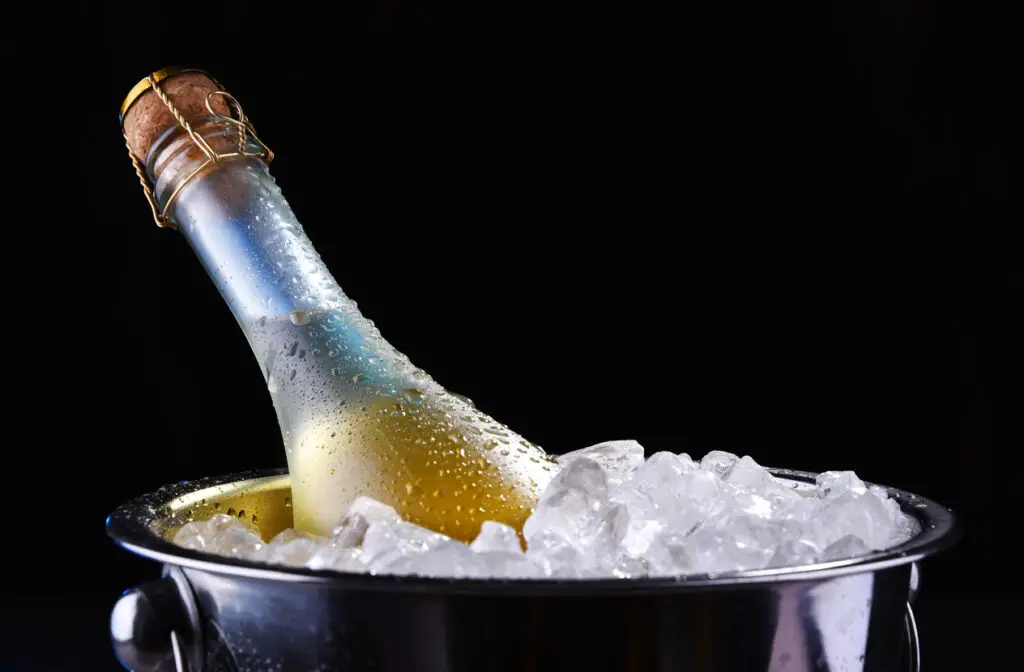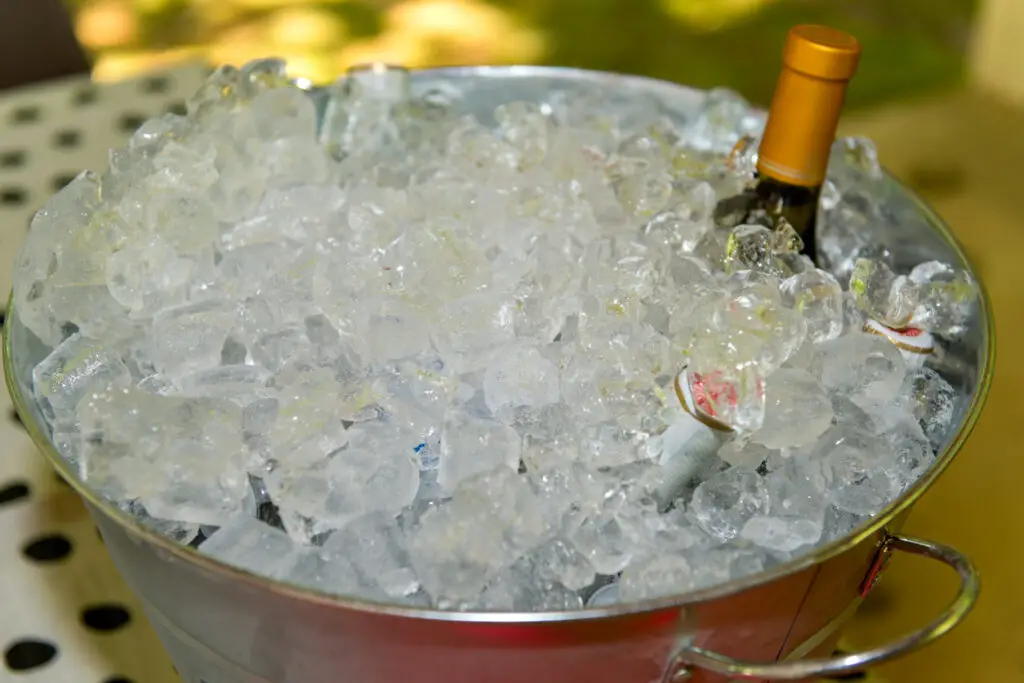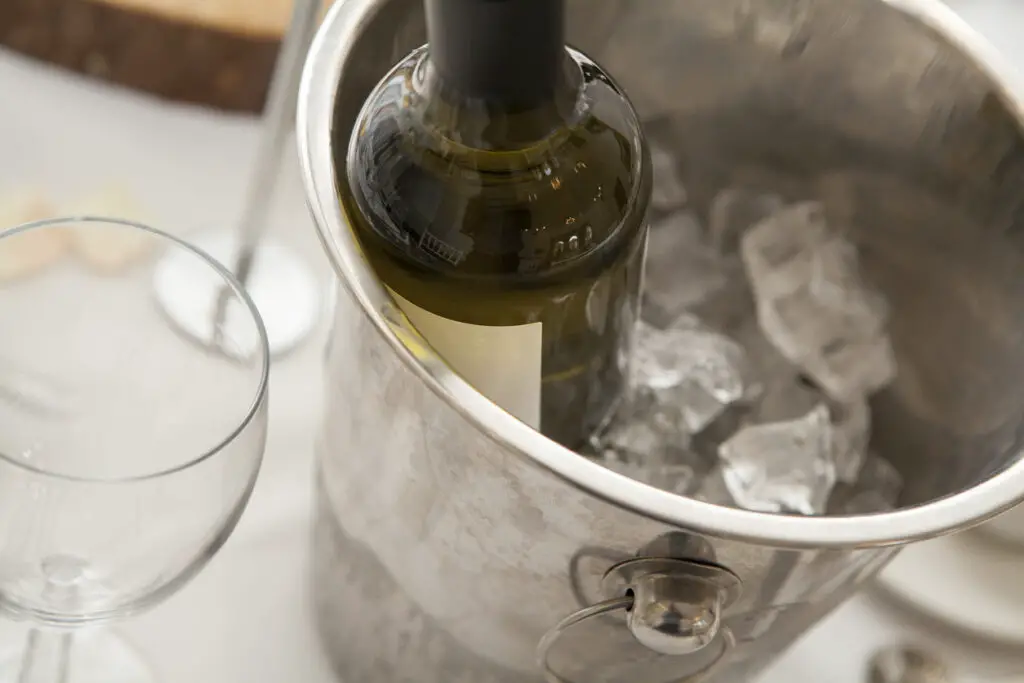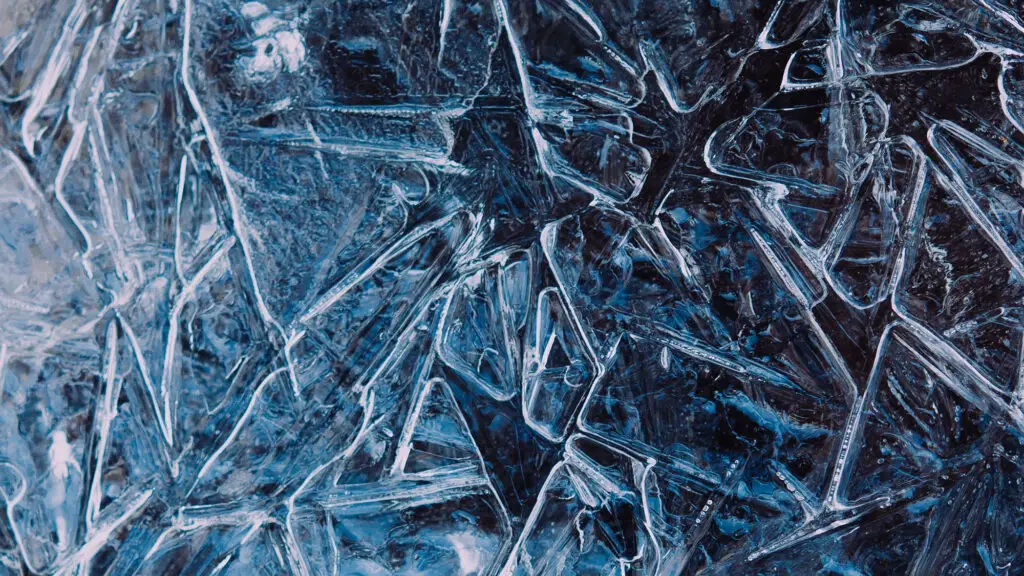You may now think who will need to freeze the wine, but some people do! Or if you froze it by accident, don’t worry; it is not spoiled. Bur really, how long does it take wine to freeze?
Wine in a regular kitchen freezer can become solid in about 5 hours. A typical freezer for the kitchen is usually around 0 °F. That is a lot colder than most freezing points for wine.
Now let’s see why it takes so long and other interesting facts on how long it takes wine to freeze.
Wine Freezing Level: What Temperature is The Freezing Point?
The wine’s freezing temperature is around 22 °F. But the freezing point for wine depends on the alcohol content of the wine. The more alcohol the wine contains, the lower its freezing point. A graph showing freezing points by ethanol percentage was compiled by the smart folks at the University of Illinois.
Ethanol and alcohol are the same things in the sense of wine. It is also more complicated than water to freeze wine because wine is acidic. 12.5% is the average alcohol content of most wine.
That means the average freezing temperature of the wine is around 22.5 °F. It won’t be exact because some of the sulfites and other non-alcoholic compounds in wine may affect the freezing point and these vary by wine. To sum up; to find your bottle’s wine freezing point, determine its alcohol content.
What Happens When Wine Freezes?
As wine freezes it expands, like just about every other liquid. Yet wine is sealed in bottles to avoid oxidation. That means that there is practically no room to expand. And oxidized wine can result if the seal breaks. Like any other product frozen for too long, frozen wine may also suffer from freezer burns.
The Oxidation Process

Author Note: The frozen wine expansion will cause the seal of a wine bottle to break in two ways. Pushing the cork out of the bottle is the first and most popular process. Or, if the bottle is not corked, the screw cap or other seal will come off.
Oxidation in the right setting and achieved rapidly is sufficient for wine. But leaving the wine in the air for too long compromises the taste of the wine.
Breaking the wine bottle itself is the second and more inconvenient way that frozen wine sheds its airtight seal. A broken bottle poses other obstacles to enjoying your wine, in addition to oxidation.
What Does Freezer Burn Mean?
Oxidation contributes to freezer burn. In terms of food, freezer burn means long product exposure to open freezing air. However, this exposure has lasted so long that the effects start dehydrating, unlike normal oxidation.
Frozen wine can, by dehydration, also lose some of its water content. Freezers are a low place where wines will mature. The taste profile and aroma become entirely altered and flattened with enough time. It can also turn into a vinegary mess with the wine’s alcohol and tannins, making it not even appropriate for cooking.
Frigid temperatures often tend to flatten out profiles of taste. But by not drinking the wine at extremely low temperatures, that’s a dilemma easily solved.
Can You Put Wine In the Freezer?
The answer is yes, you can put wine in the freezer. Freezers are dim, so the effects of light on wine are reduced. That is, at least, one advantage. The capacity to recover from bottle shock in wine will also be considered solved by freezing, so be sure to store it for enough time.
Can You Freeze Red Wine?
Yeah, it’s possible to freeze red wine. It’s possible to freeze some wine. It’s not the wine’s color that determines whether you can freeze it or not. That’s the alcohol content of the wine. Since the average alcohol content of red and white wines is similar, they behave similarly in freezing conditions. Please note that freezing wine doesn’t help wine allergies, so try to avoid reds if you have this condition.
Please check the cork or the bottle itself is not damaged and the wine has not been held in freezing temperatures for more than a few days; thawing and drinking are perfectly safe. It is not going to be the very same wine as it was before. The profile of its flavor will change slightly. But it’s not going to be gross or toxic.
Does Freezing Wine Ruin It?
Usually, freezing wine does not spoil it. Just like you, there are many tales of daring wine lovers who, having frozen their wine mistakenly, unfreeze it and enjoy it. It isn’t going to become unpalatable.
Its flavor profile may change slightly, but it should not be a big deal if the bottle or cork has not broken and the wine has not become oxidized. If you push the cork out of the bottle and leave the wine for weeks or months in the fridge, it is generally best to consider it ruined. Freezing wine, sadly, would not change the number of calories in a bottle of wine.
Is Frozen Wine Drinkable?

Author Note: Yes, people can drink frozen wine. It all just depends on what you try to get out of your wine. For a setting with high wine standards, a thawed wine is not the best choice. The wine is not going to be the very same wine planned by the winemaker. It would sacrifice its finer taste points.
It’s not going to hurt you. You can always break it open and enjoy it. Maybe not with an expensive steak or your sommelier friends.
Is Frozen Wine OK for Cooking?
Yes, you can freeze your wine for cooking. It is not only OK to use frozen cooking wine. For cooking, even wine that is a little oxidized and burnt in the freezer can be used. Nobody puts Cabernet in a stew while shoveling beef and carrots into their mouth and attempting to tease out the dark fruit finish. No one brings chardonnay into a fondue and, over gobs of cheese, meditates on its oakiness.
Any damage caused to wine by mild oxidation and freezer burn is practically moot when the wine is cooked at elevated temperatures and mixed with other intense flavors.
All we’re after when cooking is the wine’s general flavor profile, not its nuances. Freezing wine is not going to influence that.
In ice cube trays, a cool pro-tip is to freeze champagne. Around two tablespoons or an ounce is an ice cube from a regular ice cube tray. It makes it especially easy to cook with frozen wine.
How to Chill Wine
You’ll find bottles of wine set at room temperature in most supermarkets and wine shops that allow you to drink them immediately. Right after you bought it, we explored the best ways to chill your favorite bottle!
Ice Bucket
An ice bucket filled with water is the most potent conventional way of cooling down a bottle quickly. The secret here is water, so don’t forget it! A bottle of ice can chill very slowly on its own. Water surrounds the ice bottles, making the cooling process more effective. It takes about 10 minutes for red wines to chill and some 20 minutes for white wines to chill and be ready to drink.
And the wine bucket also contributes to the feeling of drinking wine, and we have to say. With water, you can also apply a generous amount of salt to the ice bucket. Adding salt enhances the ice and water’s cooling capacity.
Frozen Grapes

We wouldn’t propose adding something to a glass of wine, but frozen grapes sound like fun if you’re just in a rush and don’t have much time left.
They would not melt the wine and dilute it. To get it ready for a refill, place the rest of the bottle to chill in some of the ways we suggested above.
Author Note: You may also use ice cubes of stainless steel, designed for cooling the beverages. They are reusable and online; you can find them. Hold them in the freezer, and you know that summer is a little far away.
How Long Does It Take Wine to Freeze?
Wine in a regular kitchen freezer can become solid in about 5 hours. A typical freezer for the kitchen is about 0 °F. That is a lot colder than most freezing points for wine. And that’s why, in just a matter of hours, wines freeze solid in regular freezers.
Interestingly, if stored only at its freezing point and not below, wine can never freeze solid. That’s because the water molecules in it freeze first, as the wine freezes. This will leave behind molecules of alcohol.
The unfrozen part of the wine becomes more acidic as more and more alcohol molecules are left behind in the freezing process. As the alcohol content of the unfrozen part goes up, the freezing point goes down. This can result in the wine being slushy rather than solid frozen wine. So, if you’re looking for intense wine to freeze, store it at a temperature lower than its freezing point.
Melting Away
Wine is fantastic in all its forms; you can freeze it or boil in a pasta sauce, or just enjoy a glass right now. Don’t waste your time. Go and get the bottle! We hope you enjoyed this article on how long does it take wine to freeze.
To living a full-bodied life,
Wesley

